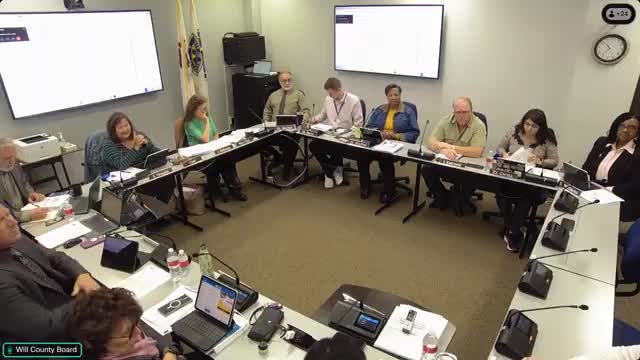Will County finance committee confronts $8.9M gap after 0% levy estimate; members spar over cuts, reserves and cannabis fund uses
Get AI-powered insights, summaries, and transcripts
Subscribe
Summary
Will County Finance Committee members spent the meeting weighing the budget consequences of a prior board vote to publish an estimated aggregate levy at 0%, which county finance staff said creates an approximate $8.9 million gap versus the county executive’s proposed 2% levy.
Will County Finance Committee members spent the meeting weighing the budget consequences of a prior board vote to publish an estimated aggregate levy at 0%, which county finance staff said creates an approximate $8.9 million gap versus the county executive’s proposed 2% levy.
Kevin (staff) told the committee that last Thursday the board passed an estimated aggregate levy to meet Truth‑in‑Taxation notice requirements; that vote is procedural and gives the public notice of the proposed levy, but the final levy and appropriations will be approved in a subsequent meeting and will be broken out by fund. “That is all you did last Thursday was pass an estimated aggregate of all the levy funds,” Kevin said.
Rishon (finance staff) and other budget officials detailed the arithmetic members later debated. Rishon said the difference between the county executive’s proposed figures and the board’s 0% estimate was roughly $8.9 million and noted the final levy extension is set by the county clerk and may vary when final numbers are provided.
The committee discussed reserve policies and special‑revenue fund balances. Multiple members asked why the corporate fund has a 25% reserve target while special reserves appear uncapped and vary by fund; finance staff explained special funds are often dedicated to specific revenue streams and purposes and that some special fund revenues cannot legally be repurposed for general obligations without board action or specific statutory authority. Rishon said corporate‑fund cash reserve policy targets a 22–25% range for the corporate fund, while special funds are tied to specific revenue sources and uses.
County‑executive staff warned of operational consequences if the county adopts a 0% levy without offsetting reductions. The county executive’s chief of staff said relying on spending out of reserves for ongoing operations is short sighted, arguing it risks essential services and cited examples including debt service, utilities and jury operations. “Spending for operationally out of reserves is a fool’s errand,” the chief of staff said, urging the board to consider the practical effects of a lower levy.
Board members proposed competing approaches. Member Destiny Ortiz presented a line‑by‑line set of suggested non‑personnel cuts and identified nearly $26 million in line‑item reductions she described as possible without touching wages or front‑line services; other members urged a narrower set of cuts targeted at supplies, technical services and discretionary items. Member Dan Reavis and others said that cutting certain non‑personnel items should be prioritized rather than immediately reducing line items that would directly affect service delivery.
Committee discussion also turned to county enterprises and special projects. Member Micah Richmond highlighted two county operations he said have lost money: a renewable natural gas (RNG) plant that he said lost roughly $2.5 million per year over two years (cumulative about $5 million) and Sunny Hill nursing home, which he said operates at about 60% occupancy (157 of roughly 238 beds) and has large temporary‑staff and overtime costs. Richmond proposed monthly profit‑and‑loss reporting for the RNG plant and operational consulting for Sunny Hill to increase occupancy and reduce contract staffing costs.
Members debated whether dedicated cannabis tax revenues should be pulled into a corporate fund to offset the levy shortfall. Some committee members urged keeping cannabis funds dedicated to community programs and services designed for populations affected by drug policy, while others said the county could reallocate some cannabis money to help fill the budget gap. Rishon reported a current balance in the cannabis fund (as presented in the meeting) of about $2,000,500.
The committee did not adopt a final set of cuts at the meeting. Staff said the next steps are for finance staff, the county executive’s office and committee members to work toward a balanced, implementable budget and levy that protects essential services; appropriations for each levy line will be voted at the board’s November meeting.
